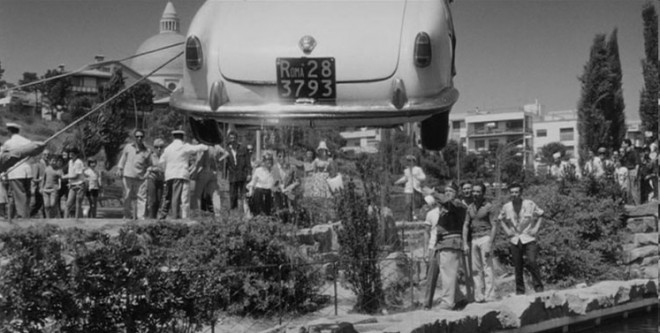The following is one of the entries from my 100 Greatest Films list, which I invite you to visit on this site if you haven’t already done so. — Dennis
Rossellini’s three-part examination of Florentine society and culture in the fifteenth century begins with a banking family. Aligned with merchants and the explosion of European trade, the Medicis embody a new pursuit of wealth and power. In its style, this 4-hour film is heir to Rossellini’s sober, immaculate Rise of Louis XIV (1966), which inaugurated his series of minimalist present-tense histories treating figures such as Socrates and Pascal. According to critic John Wyver, the world that Rossellini reveals in his Medici film “is both patently artificial and startlingly real.” Stately formalism and documentary roughness balance each other, creating a secular vision in which the religious, more primitive world of Francesco, giullare di Dio (1950) still hangs lightly about, a ray of residual simplicity in a new world of immense complication.
Leon Battista Alberti, philosopher, painter, sculptor, musician and architect, embodies the humanistic impulse that is also integral to this world. “What use is beauty?” a merchant asks as he peruses art. Art reflects humanity. Masaccio’s painting of Jesus gives scientific attention to human anatomy at the expense of a more traditional, “spiritual” approach. Its linear approach applies principles of mathematics. Art, then, incorporates a range of knowledge and attainments—including the financial, with the couple who paid Masaccio to paint the portrait themselves appearing in the piece!
We see Masaccio’s painting as it is discussed from various perspectives. Indeed, this amazing film contains many conversations on a wide range of matters, including the Florentine tax code. It is especially steeped in architecture and certain organizing ideas: freedom; “the city” as being based on families; the marriage of art and science, which have in common “the progress of mankind.” Alberti is referring to architecture, but, surely, Rossellini also has cinema in mind.
B(U)Y THE BOOK
MY BOOK, A Short Chronology of World Cinema, IS CURRENTLY AVAILABLE FROM THE SANDS FILMS CINEMA CLUB IN LONDON. USING EITHER OF THE LINKS BELOW, ACCESS THE ADVERTISEMENT FOR THIS BOOK, FROM WHICH YOU CAN ORDER ONE OR MORE COPIES OF IT. THANKS.
